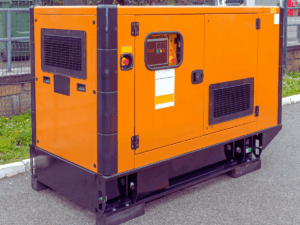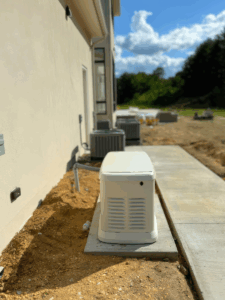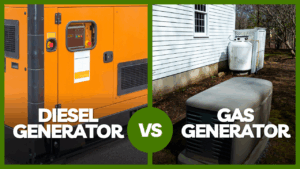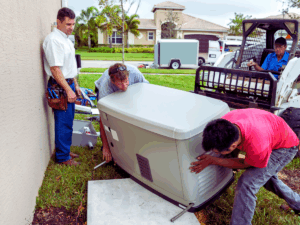Power goes out fast in Fort Worth. Storms roll in. Lines drop. The grid gets strained.
When that happens, your home sits quiet and dark unless you have a whole-home generator that steps in and carries the load.
The fuel you pick matters. You will see that difference in cost, noise, runtime, and long-term reliability.
This article shows the pros and cons of both diesel and natural gas generators in simple terms. You will see how each option works during a power outage. You will learn how the engines function and why fuel delivery affects the overall experience.
Quick Takeaways
- Diesel generators deliver strong performance, high energy density, and long runtime but require on-site diesel fuel storage.
- Gas generators run on natural gas or propane, burn cleaner, emit less carbon dioxide, and offer steady fuel supply from a gas line or tank.
- Diesel fits large homes, rural properties, and long outages. Gas fits Fort Worth homes with existing gas service and stable utilities.
- The pros and cons of each fuel source show clear tradeoffs: noise, emissions, runtime, and maintenance needs shape the best choice.
- Your best option depends on load size, fuel access, runtime needs, noise limits, and how much regular maintenance you want to handle.
What’s the Difference Between a Diesel Generator and a Gas Generator?
A diesel generator runs on diesel fuel stored on your property. A gas generator runs on natural gas from your gas line or propane from a tank. The core difference sits in the fuel source, energy density, carbon dioxide output, engine behavior, and long-term maintenance cost.
Diesel engines compress air to ignite fuel. Gas engines use spark plugs. That single difference shapes noise, service, runtime, and safety.
Diesel fuel is less flammable than natural gas. Gas fuel burns cleaner. Both rely on fossil fuels, but they feel different during an outage.
Diesel Generators: Pros, Cons & Best Uses
Diesel generators deliver raw strength. They work well under heavy loads and run long hours without complaint.
 Pros of Diesel Generators
Pros of Diesel Generators
- Higher energy density and longer runtime.
- Strong reliability under heavy loads.
- Lower maintenance needs because engines do not use spark plugs.
- Longer engine life.
Cons of Diesel Generators
- Louder operation.
- Higher upfront cost.
- Requires fuel storage on the property.
- Produces more emissions.
Best Situations for Diesel Generators
- Large homes with high electrical loads.
- Rural properties without stable natural gas access.
- Homes needing long-duration backup during extended outages.
- Properties where fuel delivery is easy or already available.
Gas Generators (Natural Gas & Propane): Pros, Cons & Best Uses
Gas generators bring convenience. You often never think about fuel because it comes straight from your gas line.
 Pros of Gas Generators
Pros of Gas Generators
- Continuous fuel supply from utility lines.
- Cleaner burning and lower emissions. Natural gas emits less carbon dioxide per unit.
- Lower fuel cost in most regions.
- Quieter operation.
Cons of Gas Generators
- Dependent on utility gas infrastructure.
- May deliver lower peak power output than diesel.
- Requires larger units for heavy loads.
- Installation cost can be higher.
Best Situations for Gas Generators
- Urban and suburban Fort Worth neighborhoods.
- Homes with natural gas already installed.
- Homeowners prioritizing low emissions and convenience.
- Occasional outage protection rather than extreme long-term runtime.
Diesel Generator vs Gas Generator: Side-by-Side Comparison
This section gives you a clean look at how these systems behave when placed next to each other.
 Fuel Efficiency
Fuel Efficiency
Diesel delivers higher efficiency, especially at partial loads. The energy density of diesel fuel helps the engine stretch runtime. Gas burns cleaner but may offer less output for each unit of fuel.
Reliability During Long Outages
Diesel stays reliable as long as you keep fuel stored. Gas generators run as long as the utility gas line stays active or your propane tank stays filled.
Maintenance Needs
Diesel engines need regular maintenance, but the engines stay simple because they have no spark plugs or ignition system. Gas engines need spark plug service and ignition checks.
Noise Level
Diesel generators are louder. Gas generators stay quieter.
Fuel Storage & Availability
Diesel storage sits on your property. Delivery must be arranged before or after storms. Gas generators pull fuel from a gas line or propane tank, which removes the need for heavy storage on your land.
Installation Cost
Diesel often brings a lower install and a higher unit cost. Gas generators often have a higher install and a variable fuel cost depending on your service area.
Environmental Impact
Diesel produces higher emissions. Natural gas emits lower levels of carbon dioxide and offers a cleaner exhaust experience.
Which Generator Is Best for Fort Worth Homeowners?
Homes in Fort Worth see storms, wind, and long, hot summers. Power drops fast during these events, and the right generator keeps your home steady.
Choose Diesel If
- You have a large home or heavy power needs.
- You live in rural areas outside city gas service.
- You want maximum runtime without relying on utilities.
Choose Gas If
- You have an existing gas line.
- You want clean, quiet, convenient backup power.
- You prefer lower operating costs over time.
Cost Breakdown: Diesel vs Gas Generators in 2025
Generator pricing shifts with fuel markets, installation needs, and the size of the system you pick. Instead of fixed national ranges, it helps to look at the cost patterns that stay consistent across both fuel types.
- Diesel generators usually cost more upfront because the engines are heavy and built for long life.
- Natural gas generators often cost more to install because they require gas line integration.
- Diesel fuel prices swing with delivery schedules and market pressure.
- Natural gas and propane prices stay steady in many service areas, which helps long-term budgeting.
- Long-term maintenance cost stays lower with diesel because the engines do not use spark plugs.
- Gas engines cost more to maintain because they need ignition checks and spark plug service.
If you want clear numbers for your home, you need a load calculation and a fuel access review. Those two factors shape your final cost far more than national averages.
How to Choose the Right Whole-Home Generator for Your Property
 You get the best match when you line up your power needs with the fuel option that supports your routine.
You get the best match when you line up your power needs with the fuel option that supports your routine.
Step 1 – Determine Your Electrical Load
Look at the appliances you want to run. AC units, heat pumps, and electric water heaters raise the load fast.
Step 2 – Check Your Fuel Access (Gas Line, Propane, Diesel Delivery)
See what is already on your property. A gas line changes everything.
Step 3 – Decide Your Runtime Expectations
Short outage? Long outage? Hour or days? Runtime shapes the fuel choice.
Step 4 – Evaluate Noise & Space Restrictions
Diesel brings more noise. Gas requires clear space for line routing.
Step 5 – Get a Professional Load Assessment
A trained tech can size the generator and prevent overload issues. This keeps your system safe and reduces the maintenance cost you will face later.
FAQ: Diesel Generator vs Gas Generator
Which lasts longer, diesel or gas generators?
Diesel engines last longer because they run at lower RPM and use simple combustion.
Which generator is more efficient?
Diesel is more fuel efficient because diesel fuel holds more energy per unit.
Which type is cheaper to run?
Gas often costs less to run if the natural gas rate stays steady in your area.
Is diesel safer than natural gas?
Diesel fuel is less flammable. Natural gas needs careful handling but burns cleaner.
Can a gas generator run during a gas outage?
No. If the gas line fails, the generator stops unless you run propane.
Are whole-home generators worth it in Fort Worth?
Yes. Fort Worth sees regular storms and grid strain. Generators keep your home stable.
Should I choose propane instead of natural gas?
Use propane if you lack a natural gas line or want full control over storage.
Final Verdict: Diesel or Gas — What’s the Better Generator?
The better generator depends on how your home works. Diesel fits heavy loads and long runtimes. Gas fits quiet operation and steady fuel access.
Both diesel and natural gas generators can support your home during a power outage. Your fuel source guides your experience, your maintenance schedule, and your cost over time.
Fort Worth homeowners deal with storms, heat, and grid issues. Pick the fuel that supports the way you live.
Schedule Generator Installation or Repair with Comfort Experts
 If you want a generator that works when your home needs it, we can help. Comfort Experts serves Fort Worth and nearby communities with full generator repair and installation. Our team handles load calculations, fuel access checks, and full system setup.
If you want a generator that works when your home needs it, we can help. Comfort Experts serves Fort Worth and nearby communities with full generator repair and installation. Our team handles load calculations, fuel access checks, and full system setup.
When you need power, you need electrical genius.
Schedule your in-home generator assessment today.
